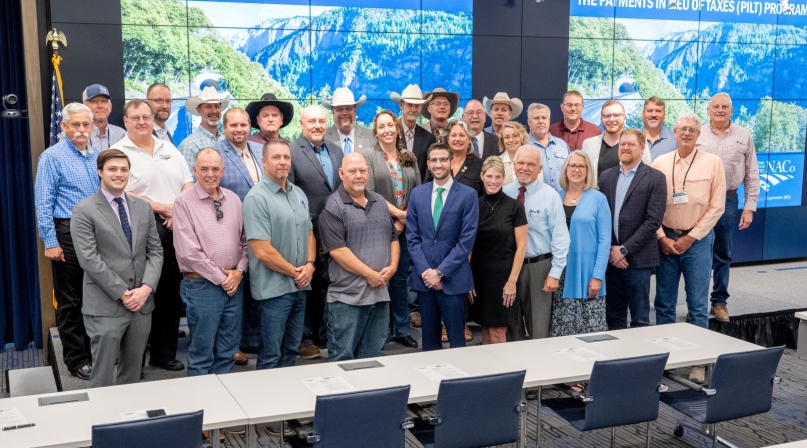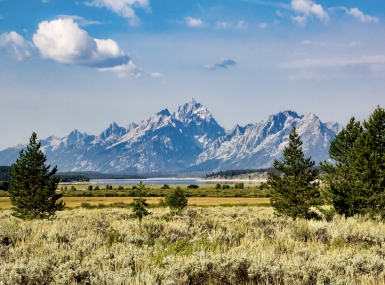Public lands champions visit Capitol Hill

Key Takeaways
County officials from across the country traveled last week to Washington, D.C. to advocate for federal public land policies, sharing stories with members of Congress of how the Payment in Lieu of Taxes (PILT) and Secure Rural Schools (SRS) programs help counties fund essential services, including search and rescue operations, infrastructure and education.
Last year $578.8 million in PILT funding was authorized and distributed this year.
Nearly one-third of the land in the United States is owned by the federal government — the majority of which is in the West. Because counties can’t tax federally owned land, they’re left to provide services including law enforcement, emergency medical services, solid waste disposal and fire and forest management, regardless of funding sources. In some counties, more than 90% of the land is public, including in Gila County, Ariz., where a mere 3.5% of land is privately owned.
“I don’t think any of the people we met with [on Capitol Hill] needed convincing that we need to maintain PILT, but one thing that I think we did was speak to the diversity of each county’s need for it,” said Gila County, Ariz. Supervisor Steve Christensen.
“And also debunking the idea that it’s just some kind of a bonus at the end of the year or just some kind of a refund. ‘Hey, here’s your birthday present.’ This is something that we need absolutely to function — without it, our county would be in serious financial issues,” Christensen said.
Both the House and Senate Interior Appropriations Committee bills for the upcoming fiscal year fully fund PILT. Melissa Zimmerman, clerk for the U.S. Senate Committee on Appropriations, told county officials that despite what she referred to as the U.S. government’s “very uncertain budget environment,” it’s guaranteed that PILT will be fully funded in the final full year bill in “such sum as may be necessary,” regardless whether PILT costs are over the president’s or congressional budget estimates.
“We get letters from both sides of the aisle,” Zimmerman said. “This is a bipartisan, bicameral program. I can hardly think of anything else that we fund that gets such widespread support and that’s because the members hear from you about how important PILT is to your community.
“So how does this work in the Appropriations Committee? We actually consider this a must-pay bill. When I sit down to my spreadsheet to figure out how we’re going to fund our subcommittee, I look at PILT and one or two other things and I say, ‘Well, we must pay for these and then what money do we have left?’ It is simply something that we lock in.”
Rep. Harriet Hageman (R-Wyo.) said that she thinks the government needs to “be putting power back where it belongs, which is with our state legislators and our county commissioners,” and spoke to the importance of having longer term solutions surrounding funding of PILT and SRS.
“I think that it is absolutely a failed business model that we have our counties and our communities having to come, hat in hand, to Congress every year, every other year, every third year for funding because of the fact that we have such vast areas of federal lands, primarily in the interior West,” Hageman said. “I think counties need to be at the forefront of this discussion.
“And I think that you are the ones that need to start pushing your legislators and your members of Congress to talk about whether we can start doing some different kinds of pilot projects that would allow you, would allow our states, would allow our state agencies, would allow our local communities more input and involvement with the management of these resources, if not outright ownership.”
Along with funding education and infrastructure such as roads and bridges, SRS payments help rural counties and school districts affected by the decline in revenue from timber harvests on federal land fund conservation projects and wildfire prevention programs. More than 720 counties and 4,000 school districts in 41 states rely on SRS funding.
Prairie County, Mont. Commissioner Todd Devlin, chairman of NACo’s Public Lands Steering Committee; Nevada County, Calif. Supervisor Heidi Hall; Valley County, Idaho Commissioner Sherry Maupin; Stevens County, Wash. Commissioner Wes McCart, Greenbrier County, W. Va. Commissioner Tammy Tincher and Humboldt County, Nev. Commissioner Ken Tipton all spoke to the group of county officials who came to D.C. about the importance of fully funding PILT and SRS and how it’s used in their respective counties.
Examples of what the counties devote the federal funding toward include:
- Wildfire education and training in Nevada County, Calif.;
- Staffing schools in Valley County, Idaho;
- Emergency and homeland security in Greenbrier County, W. Va. and
- Road maintenance in Humboldt County, Nev., among numerous other projects and essential services.
“Without the PILT funding, without the SRS funding, we would not be able to provide these things that are required and that create the communities that we have and the services we’re able to offer,” Tincher said. “I would invite each of you to come to West Virginia, and I would invite you to explore our public lands — I invite you to go to your home state and explore those lands — but keep in mind that whole time, that there’s funding required to take care of those lands and without this funding, that we come and ask for every year, we would not be able to provide that.”
Stevens County, Wash. receives approximately $830,000 in PILT funding, which is about 5% of the county’s total budget and 13% of its property tax. McCart put into perspective how essential the PILT and SRS payments are to his rural county and advocated for long-term mandatory funding.
“If [those funds] were to go away … it would take 13 consecutive years of maximum increase just to simply replace those lost revenues,” McCart said. “And we fare a lot better in Stevens County than a lot of counties that receive PILT … But let me be a little more nonspecific of how we would replace these revenues if they were gone. I could eliminate my entire Assessor’s Office, or I could eliminate my entire Auditor’s Office or I could eliminate my entire Treasurer’s Office plus other employees. None of those are valid choices. I can’t eliminate by law any of those departments.
“Yearly appropriations for PILT give us great uncertainty,” McCart noted. “We appreciate the fact that it is being fully funded and we continue to advocate to keep it funded, but we need some more long-term certainty. How do we plan long-term with one-time money that we have to beg for every year? We shouldn’t have to beg for this money as counties. We should be granted that money without having to come and advocate every single year.”
Pictured at the top: First Row: Joe Jackson, NACo; Jerry Taylor, Garfield County, Utah; Jeff Hough, Bannock County, Idaho; Darin Bushman, Piute County, Utah; Jonathan Shuffield, NACo; Tammy Tincher, Greenbrier County, W.Va.; Brent Reinke, Twin Falls County, Idaho; Sherry Maupin, Valley County, Idaho; Seth Grigg, Idaho Association of Counties; Jack Lytle, Daggett County, Utah. Second Row: Ned Coe, Modoc County, Calif.; Joe Briggs, Cascade County, Mont.; Greg Miles, Duchesne County, Utah; Barry Shullanberger, Lake County, Ore.; Cassie Hall, Mineral County, Nev.; Heidi Hall, Nevada County, Calif.; Shantil Siaperas, Montana Association of Counties Third Row: Dennis Blackburn, Wayne County, Utah; Eric Bryson, Montana Association of Counties; Greg Chilcott, Ravalli County, Mont.; Varlin Higbee, Lincoln County, Nev.; John Espy, Carbon County, Wyo.; Todd Devlin, Prairie County, Mont.; Wes McCart, Stevens County, Wash.; John Peters, Mono County, Calif., Zeke Lee, Utah Association of Counties; Steve Christensen, Gila County, Ariz. Fourth row: Ken Tipton, Humboldt County, Nev.; Dwayne McFall, Fremont County, Colo.; Clay Kiesling, Union County, New Mex.; Tim Bertling, Boundary County, Idaho








